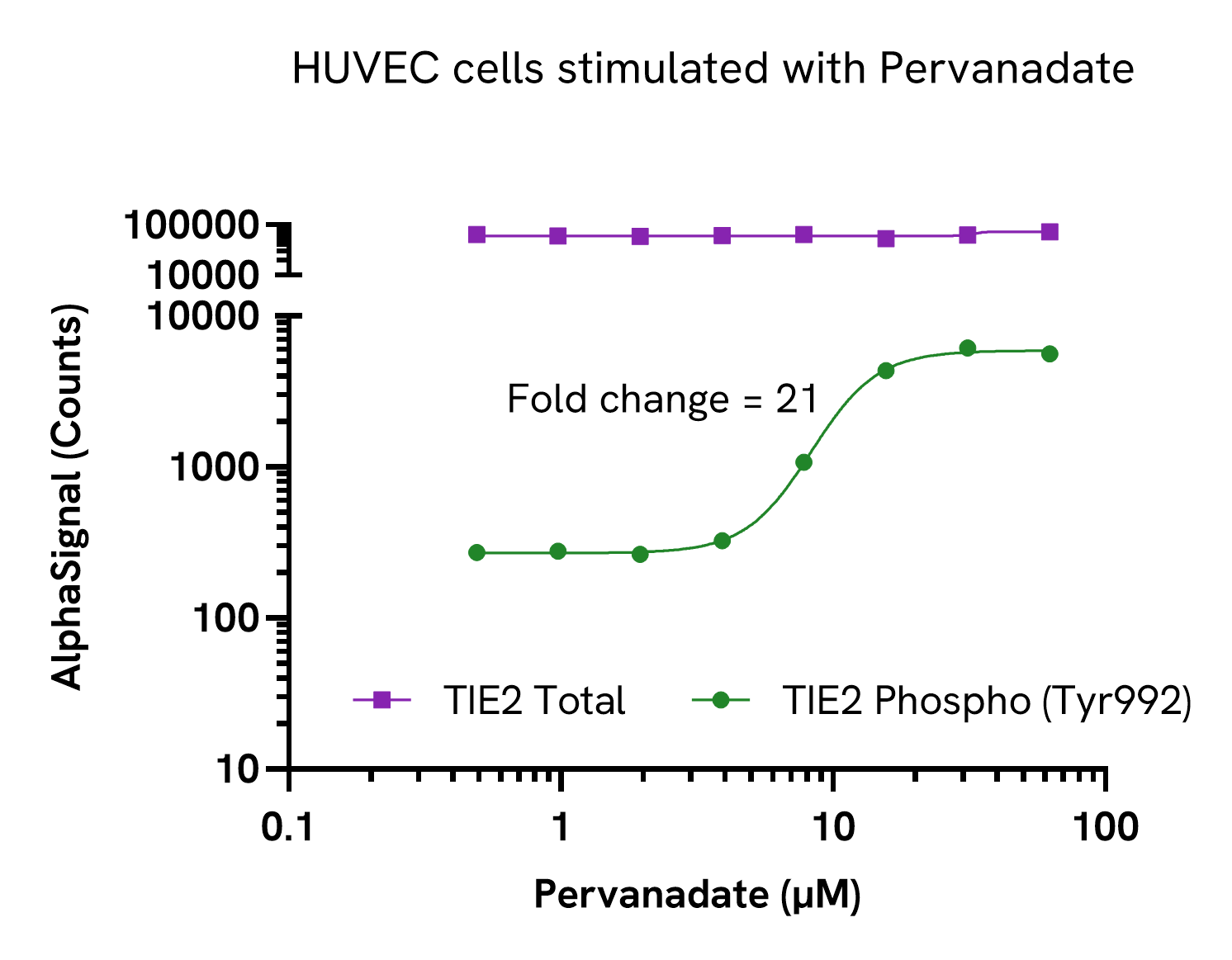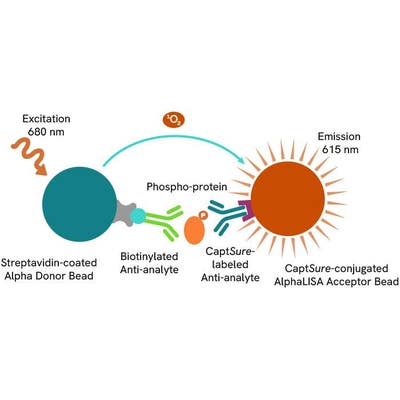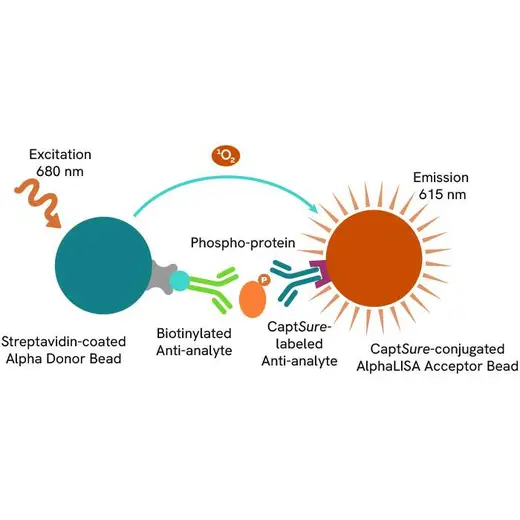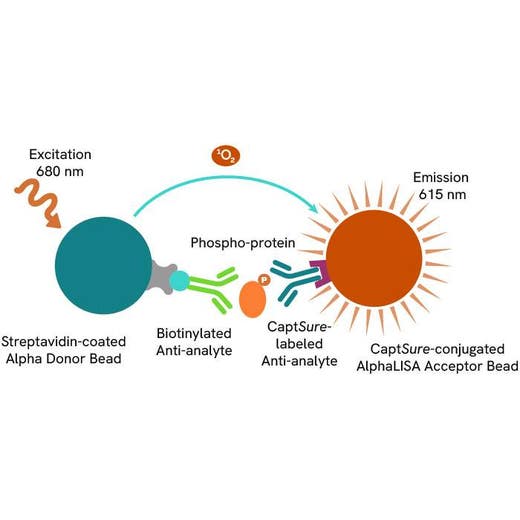

AlphaLISA SureFire Ultra Human Phospho-TIE2 Tyr992 Detection Kit, 50,000 Assay Points

AlphaLISA SureFire Ultra Human Phospho-TIE2 Tyr992 Detection Kit, 50,000 Assay Points




The AlphaLISA™ SureFire® Ultra™ Human Phospho-TIE2 (Tyr992) assay is a sandwich immunoassay for quantitative detection of phospho-TIE2 in cellular lysates using Alpha technology.
For research use only. Not for use in diagnostic procedures. All products to be used in accordance with applicable laws and regulations including without limitation, consumption and disposal requirements under European REACH regulations (EC 1907/2006).
| Feature | Specification |
|---|---|
| Application | Cell Signaling |
| Sample Volume | 10 µL |
The AlphaLISA™ SureFire® Ultra™ Human Phospho-TIE2 (Tyr992) assay is a sandwich immunoassay for quantitative detection of phospho-TIE2 in cellular lysates using Alpha technology.
For research use only. Not for use in diagnostic procedures. All products to be used in accordance with applicable laws and regulations including without limitation, consumption and disposal requirements under European REACH regulations (EC 1907/2006).


AlphaLISA SureFire Ultra Human Phospho-TIE2 Tyr992 Detection Kit, 50,000 Assay Points


AlphaLISA SureFire Ultra Human Phospho-TIE2 Tyr992 Detection Kit, 50,000 Assay Points


Product information
Overview
The TEK receptor tyrosine kinase (TIE2), encoded by the TEK gene in humans, is primarily expressed on endothelial cells. Upon binding with angiopoietin-1 (Angpt1), TIE2 induces angiogenesis and supports endothelial cell survival. This activation leads to downstream signaling pathways, including MEK/ERK, IKKb/NFkB, and AKT. Consequently, TIE2 contributes to vascular stability, cellular proliferation, inflammation, and cell survival. Elevated levels of Ang1 and/or Ang2 have been observed in patients with various cancers.
The AlphaLISA SureFire Ultra Human Phospho-TIE2 (Tyr992) Detection Kit is a sandwich immunoassay for the quantitative detection of phospho-TIE2 in cellular lysates, using Alpha technology.
Formats:
- The HV (high volume) kit contains reagents to run 100 wells in 96-well format, using a 60 μL reaction volume.
- The 500-point kit contains enough reagents to run 500 wells in 384-well format, using a 20 μL reaction volume.
- The 10,000-point kit contains enough reagents to run 10,000 wells in 384-well format, using a 20 μL reaction volume.
- The 50,000-point kit contains enough reagents to run 50,000 wells in 384-well format, using a 20 μL reaction volume.
AlphaLISA SureFire Ultra kits are compatible with:
- Cell and tissue lysates
- Antibody modulators
- Biotherapeutic antibodies
Alpha SureFire kits can be used for:
- Cellular kinase assays
- Receptor activation studies
- High-throughput drug screening
Specifications
| Application |
Cell Signaling
|
|---|---|
| Automation Compatible |
Yes
|
| Brand |
AlphaLISA SureFire Ultra
|
| Detection Modality |
Alpha
|
| Host Species |
Human
|
| Lysis Buffer Compatibility |
Lysis Buffer
|
| Molecular Modification |
Phosphorylation
|
| Product Group |
Kit
|
| Sample Volume |
10 µL
|
| Shipping Conditions |
Shipped in Blue Ice
|
| Target |
TIE2
|
| Target Class |
Phosphoproteins
|
| Target Species |
Human
|
| Technology |
Alpha
|
| Therapeutic Area |
Oncology
|
| Unit Size |
50,000 Assay Points
|
Assay validation
Induction of TIE2 Phospho (Tyr992) in HUVEC cells
HUVEC cells were seeded in a 96-well culture plate (20,000 cells/well) in complete medium and incubated for 48 hours at 37°C, 5% CO2. The cells were further treated with increasing concentrations of Pervanadate for 30 minutes.
After treatment, the cells were lysed with 50 µL of lysis buffer for 10 minutes at RT with shaking at 350 rpm. TIE2 Phospho (Tyr992) and Total levels were evaluated using respective AlphaLISA SureFire Ultra assays. For the detection step, 10 µL of cell lysate (approximately 8,000 cells) were transferred into a 384-well white OptiPlate, followed by 5 µL of Acceptor Mix and incubated for 1 hour at RT. Finally, 5 µL of Donor Mix was then added to each well and incubated for 1 hour at RT in the dark. The plate was read on an Envision Nexus™ using standard AlphaLISA settings.

Resources
Are you looking for resources, click on the resource type to explore further.
Detection of Histone H3 Methylation Using AlphaLISA Assay
In this technical note, you will discover how this AlphaLISA...
Comparative Analysis of AlphaLISA and ELISA PD-L2 Assays in Human Serum
In this technical note, the performance of an AlphaLISA PD...
Measuring Immune Checkpoint Molecules in PBMCs with AlphaLISA and Dynabeads®
In this technical note, learn how AlphaLISA can be...


How can we help you?
We are here to answer your questions.






























